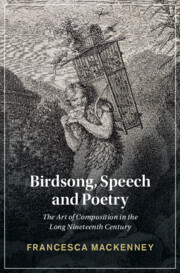Book contents
- Birdsong, Speech and Poetry
- Cambridge Studies In Nineteenth-Century Literature And Culture
- Birdsong, Speech and Poetry
- Copyright page
- Dedication
- Contents
- Figures
- Acknowledgements
- Introduction
- Chapter 1 The Science of Birdsong
- Chapter 2 The Science of Language:
- Chapter 3 ‘Prelusive Notes’
- Chapter 4 ‘Undersong’
- Chapter 5 ‘We Teach ’Em Airs That Way’
- Conclusion
- Notes
- Bibliography
- Index
- Cambridge Studies In Nineteenth-Century Literature And Culture
Chapter 3 - ‘Prelusive Notes’
Coleridge and the Wordsworths
Published online by Cambridge University Press: 15 September 2022
- Birdsong, Speech and Poetry
- Cambridge Studies In Nineteenth-Century Literature And Culture
- Birdsong, Speech and Poetry
- Copyright page
- Dedication
- Contents
- Figures
- Acknowledgements
- Introduction
- Chapter 1 The Science of Birdsong
- Chapter 2 The Science of Language:
- Chapter 3 ‘Prelusive Notes’
- Chapter 4 ‘Undersong’
- Chapter 5 ‘We Teach ’Em Airs That Way’
- Conclusion
- Notes
- Bibliography
- Index
- Cambridge Studies In Nineteenth-Century Literature And Culture
Summary
Chapter three explores how Coleridge and the Wordsworth siblings responded to and engaged with larger questions surrounding birdsong, speech and poetry. While Coleridge throughout his life brooded over metaphysical arguments regarding ‘the one life within us and abroad’ (‘The Eolian Harp’, 1795), Dorothy Wordsworth’s journals are filled with close, detailed descriptions of birds and their songs that are neither assimilated to nor inhibited by any overarching theory regarding the sentience of other creatures and our human relation to them. As he responded to his sister’s lively observations and the philosophical arguments in which he found his friend so deeply embroiled, William Wordsworth was led into larger discussions about what may be going on inside the heads of various human and non-human others. Drawing on his own experiences of composing and ‘muttering’ over his poems in daily walks with his sister, Wordsworth hints at a subvocal language of thought that is patterned and shaped, though not always or exactly worded. Out of a deep personal recognition of a grave disjuncture between thinking and saying, Wordsworth throughout his writing explores the inner lives of others in ways that would prove crucial to Clare, Hardy and other poets writing in the following centuries.
Keywords
Information
- Type
- Chapter
- Information
- Birdsong, Speech and PoetryThe Art of Composition in the Long Nineteenth Century, pp. 60 - 100Publisher: Cambridge University PressPrint publication year: 2022
